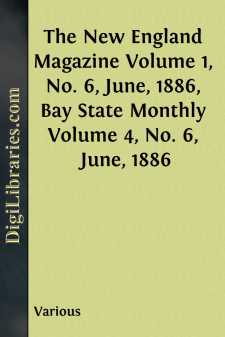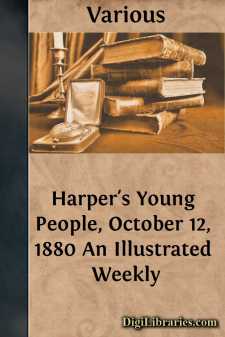Categories
- Antiques & Collectibles 13
- Architecture 36
- Art 48
- Bibles 22
- Biography & Autobiography 813
- Body, Mind & Spirit 142
- Business & Economics 28
- Children's Books 13
- Children's Fiction 10
- Computers 4
- Cooking 94
- Crafts & Hobbies 4
- Drama 346
- Education 46
- Family & Relationships 57
- Fiction 11828
- Games 19
- Gardening 17
- Health & Fitness 34
- History 1377
- House & Home 1
- Humor 147
- Juvenile Fiction 1873
- Juvenile Nonfiction 202
- Language Arts & Disciplines 88
- Law 16
- Literary Collections 686
- Literary Criticism 179
- Mathematics 13
- Medical 41
- Music 40
- Nature 179
- Non-Classifiable 1768
- Performing Arts 7
- Periodicals 1453
- Philosophy 64
- Photography 2
- Poetry 896
- Political Science 203
- Psychology 42
- Reference 154
- Religion 513
- Science 126
- Self-Help 84
- Social Science 81
- Sports & Recreation 34
- Study Aids 3
- Technology & Engineering 59
- Transportation 23
- Travel 463
- True Crime 29
Sort by:
by:
Edmund Gosse
THE FUTURE OF ENGLISH POETRYJ’ai vu le cheval rose ouvrir ses ailes d’or,Et, flairant le laurier que je tenais encor,Verdoyant à jamais, hier comme aujourd’hui,Se cabrer vers le Jour et ruer vers la Nuit.Henri de Régnier.In venturing this afternoon to address an audience accustomed to listen to those whose positive authority is universally recognized, and in taking for my theme a subject not,...
more...
by:
Various
I. The Origin and Extent of Slavery in the Several Economic Zones of Africa Slavery in Africa has existed from time immemorial, having arisen, not from any outside influence, but from the very nature of the local conditions. The three circumstances necessary to develop slavery are: First, a country favored by the bounty of nature. Unless nature yields generously it is impossible for a subject class to...
more...
by:
James Stalker
FOREWORD By Wilbert W. White, D.D. When asked to write a foreword to Dr. Stalker's "Life of St. Paul," I thought of two things: first the impression which I had received from a sermon that I heard Dr. Stalker preach a good many years ago in his own pulpit in Glasgow, Scotland, and secondly, the honor conferred in this privilege of writing a foreword to one of Dr. Stalker's books. I...
more...
CHAPTER I Lady Anselman stood in the centre of the lounge at the Ritz Hotel and with a delicately-poised forefinger counted her guests. There was the great French actress who had every charm but youth, chatting vivaciously with a tall, pale-faced man whose French seemed to be as perfect as his attitude was correct. The popular wife of a great actor was discussing her husband's latest play with a...
more...
by:
Various
Williams College has something peculiar and romantic in its history, as well as in its site amid the beautiful hills of Berkshire. It had its birth upon the very frontiers of civilization, and amid the throes of that struggle which was to decide finally whether the control of this continent, and the permanent shaping of its institutions and its destiny were to be French or English. The nascent colleges...
more...
INTRODUCTION Sir Thomas More, son of Sir John More, a justice of the King’s Bench, was born in 1478, in Milk Street, in the city of London. After his earlier education at St. Anthony’s School, in Threadneedle Street, he was placed, as a boy, in the household of Cardinal John Morton, Archbishop of Canterbury and Lord Chancellor. It was not unusual for persons of wealth or influence and sons of...
more...
by:
Various
COACHY. BY ELINOR VEY. The first time I ever saw Coachy she was scratching about on the garden walk, kicking the dirt out in two ways behind her, and then nimbly hitching back a step or two and staring and pecking at the hole that she had made. Every little while she said something to herself in a comical drawling tone, standing on one foot, and looking up at me with curious eye, as if wondering who I...
more...
by:
Charles Lamb
INTRODUCTION The earliest poem in this volume bears the date 1794, when Lamb was nineteen, the latest 1834, the year of his death; so that it covers an even longer period of his life than Vol. I.—the "Miscellaneous Prose." The chronological order which was strictly observed in that volume has been only partly observed in the following pages—since it seemed better to keep the plays together...
more...
by:
John Locke
CHAPTER I. OF WORDS OR LANGUAGE IN GENERAL. 1. Man fitted to form articulated Sounds. God, having designed man for a sociable creature, made him not only with an inclination, and under a necessity to have fellowship with those of his own kind, but furnished him also with language, which was to be the great instrument and common tie of society. Man, therefore, had by nature his organs so fashioned, as...
more...
by:
William Benson
LETTER I. SIR, am now going to obey your Commands; but you must let me do it in my own way, that is, write as much, or as little at a time as I may have an Inclination to, and just as things offer themselves. After this manner you may receive in a few Letters, all that I have said to you about poetical Translations, and the resemblance there is between Virgil's and Milton's Versification, and...
more...











